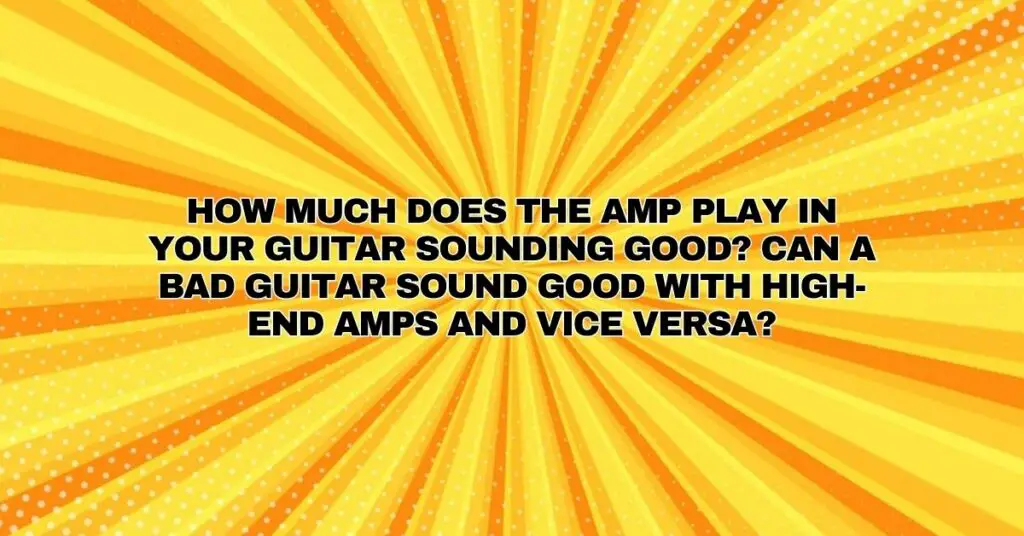The eternal quest for the perfect guitar tone often revolves around the interplay between the guitar itself and the amplifier it’s plugged into. Many guitarists ponder the significance of the amp in shaping their sound and wonder if a bad guitar can sound good through a high-end amp, or if a fantastic guitar can transform a mediocre amp. In this comprehensive article, we’ll explore the essential role of the amplifier in your guitar’s tone and the nuances of this intricate relationship.
Understanding the Amplifier’s Contribution:
An amplifier is not merely a device for making your guitar louder. It’s an integral component of your signal chain that significantly influences your tone. Here’s a breakdown of how amplifiers affect your sound:
1. Amplification and Signal Processing: Amplifiers take the electrical signal generated by your guitar’s pickups and boost it to a level that can drive a speaker. During this process, the amp can add color, warmth, and character to your sound.
2. Preamp and Power Amp Stages: Amplifiers consist of a preamp stage and a power amp stage. The preamp shapes the initial character of your tone, while the power amp amplifies it further. The combination of these stages can introduce both clean and overdriven qualities to your sound.
3. Speaker and Cabinet: The speaker and cabinet are integral parts of the amplification process. The type and quality of the speaker can significantly impact your sound, contributing to factors like resonance, frequency response, and projection.
4. Equalization (EQ): Most amplifiers come with EQ controls that allow you to shape your tone by adjusting bass, midrange, and treble frequencies. These controls enable you to tailor your sound to your liking.
5. Gain Stages: Many amplifiers, especially those designed for electric guitars, include gain stages that produce overdrive or distortion. These stages are essential for crafting classic rock and blues sounds, among others.
The Role of the Guitar:
Your guitar is the primary source of your tone. The type of pickups, the tonewoods, and the build quality all contribute to the sound that your guitar produces. When you plug a guitar into an amplifier, you’re essentially sending the guitar’s unique character through the amp’s signal chain.
Can a Bad Guitar Sound Good with a High-End Amp?
Yes, a poor-quality or “bad” guitar can benefit from a high-end amp. A high-quality amplifier has the potential to enhance the good qualities of a guitar and mask some of its shortcomings. Here’s how this can happen:
- Amplification Quality: High-end amplifiers are designed with meticulous attention to sound quality. They tend to have better components, more transparent signal paths, and sophisticated circuitry that can highlight the strengths of your guitar while minimizing its weaknesses.
- Tonal Control: High-end amplifiers often feature comprehensive EQ controls, allowing you to fine-tune your sound. You can compensate for tonal imbalances in your guitar or shape the sound to your preference.
- Dynamic Response: High-end amps tend to be more responsive to your playing dynamics, which means they can bring out the nuances in your guitar’s sound. This responsiveness can lead to a more expressive and musical performance.
Can a Great Guitar Make a Bad Amp Sound Good?
While a great guitar can undoubtedly improve the sound of a low-quality or “bad” amp, it can’t work miracles. A poor amp will always impose limitations on your tone. Here’s how a great guitar can affect your sound through a mediocre amp:
- Tonal Enhancement: A fantastic guitar with high-quality pickups and tonewoods can add clarity, definition, and rich harmonic content to your tone. This improvement is particularly noticeable in the clean and mildly overdriven settings of a subpar amp.
- Sensitivity: A great guitar will be more responsive to your playing dynamics, allowing you to extract a wider range of tones from a limited amp.
- Comfort and Playability: A high-end guitar typically offers superior playability and comfort, enhancing your overall experience, even if the amp’s tonal limitations remain.
The Balance of Gear:
In the search for your ideal tone, it’s essential to strike a balance between your guitar and amp. The quality of both components matters, and they should complement each other. A great guitar with a high-end amp can produce fantastic results, just as a high-quality amp can enhance the sound of a less-than-perfect guitar.
In Conclusion: It’s a Partnership:
The guitar and amp are partners in your tone journey. While each has a distinct role, their combined synergy creates the sound you seek. A high-end amp can indeed make a bad guitar sound better, but it can’t completely transform it. Similarly, a great guitar can enhance the potential of a mediocre amp, but it can’t eliminate the amp’s limitations. Your quest for the perfect tone should include finding the right balance of gear, understanding their strengths and weaknesses, and embracing the unique character of your instrument and amplifier.


